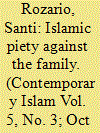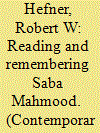|
|
|
Sort Order |
|
|
|
Items / Page
|
|
|
|
|
|
|
| Srl | Item |
| 1 |
ID:
106699


|
|
|
|
|
| Publication |
2011.
|
| Summary/Abstract |
One might suppose that a foundational element of proper Muslim behaviour is respect for one's parents. However, it is not unusual in the contemporary Islamic world, both in Muslim-majority countries and in the diaspora, for young people to be much more 'Islamic' in behaviour, dress and lifestyle than their parents. As this may suggest, modernist Islamic piety is not infrequently directed by young people against their parents, as a mode of resistance to parental authority. However, wearing the hijab, becoming a follower of a Sufi shaykh, or marrying a 'good' Muslim spouse from another ethnic group to one's own, are different kinds of resistance from, for example, joining an inner-city youth gang, or rejecting one's parents' Asian cultural background for a more globalised identity. I discuss some of the ways in which Islamic piety can be deployed in resistance to parental authority through case studies from my Economic and Social Research Council-funded field research in Bangladesh and the UK, and consider in what ways these forms of behaviour resemble, and differ from, more familiar forms of resistance.
|
|
|
|
|
|
|
|
|
|
|
|
|
|
|
|
| 2 |
ID:
167510


|
|
|
|
|
| Summary/Abstract |
Saba Mahmood's untimely passing on March 10, 2018 was a tragic loss for family, friends, and colleagues, as well as for cultural anthropologists inspired by her scholarship over the past two decades. Her influence has been no less far-reaching in contemporary Islamic and gender studies, as well as the anthropology of ethics. It is against the backdrop of her legacy that this essay seeks to pay homage to and critically reflect on Mahmood's scholarship. It focuses on and assesses Mahmood's contributions as an anthropologist of Islam, subjectivity, and ethics, paying particular attention to the debates that have emerged in the wake of her scholarship on the ethics of piety, the ambivalent nature of subjectivity, and the meanings of freedom and tradition. The assessment suggests that there is an unresolved tension between Mahmood's experience-near reflections on the ethical care of the pious self, on one hand, and her more sweeping critiques of freedom and the liberal project. The essay concludes with some thoughts on where the anthropology of Islam is moving with regard to ethics, plurality, and the ambivalence of subjectivity.
|
|
|
|
|
|
|
|
|
|
|
|
|
|
|
|
|
|
|
|
|